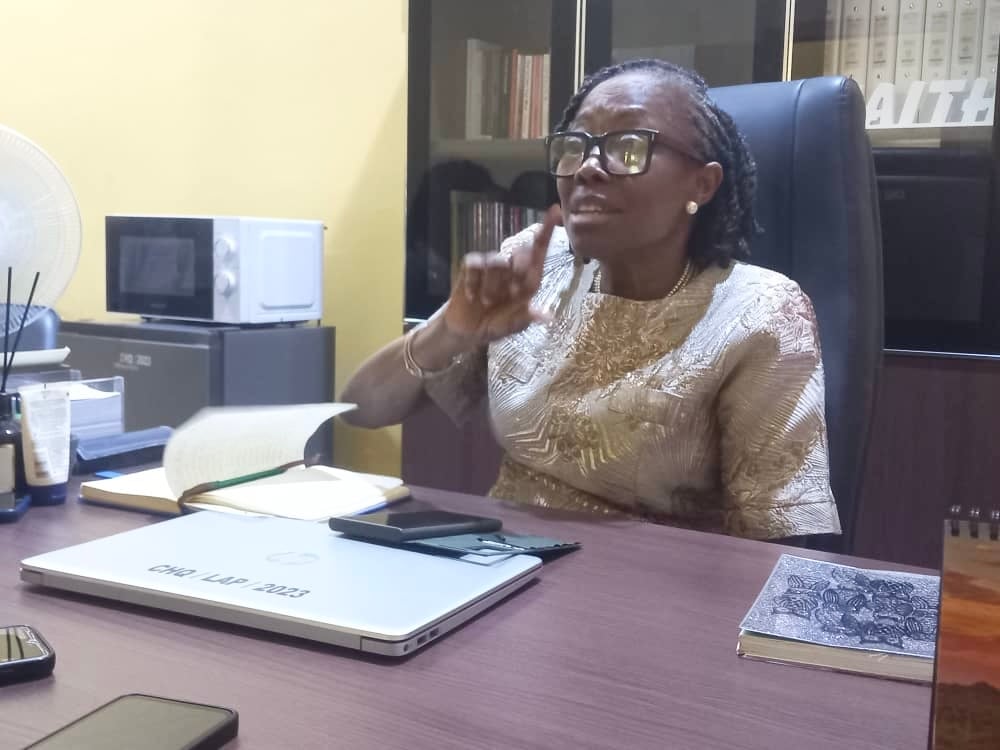Bashorun Oluwadamilare Lukmon is the founder, Codedfeet, brand that specialises in footwears and fashion leather products, belts, clutches and hand bangles. In this interview, the graduate of Education Economics shared his journey into shoemaking and how it led to establishing a training hub for youth to acquire skills in shoemaking.
The Director of Chrisland Schools, Mrs. Ayoola Akinyeye has said punishment is not the only option to correct and instill discipline in students, stressing the need for schools to understand behavior management.
In this interview, she explained about the measures put in place to curb indiscipline and and improve excellence
What is the level of partnership with the parents after the recent incidents involving two of your students?
So on the Whitney case, because there’s litigation going on, I’m going to have to refrain from commenting on that, same with the Dubai case. But I can talk to you about what we’re doing with regards to partnerships with our parents, how we manage behavior, and the steps we take to keep our children safe.
Partnerships with our parents have never been taken for granted. It has never been called into question. We have a very vibrant PTA community, led by our PTA Chairperson. In my role, I have found them extremely supportive. And when I say extremely supportive, they are not puppets. Supportive means they are also my critical friends.
They’re very vocal, and they will tell me what it is they want to see in a school, their expectations for their children. It makes it easy for me to deliver on those promises to them. So I have a very positive, very warm and vibrant relationship with them. I would frequently call them up, individually or collectively, to sound out ideas, to discuss initiatives, and get their views, from a parent’s point of view.
So, transparency and relationship with the stakeholders would never have been better.
How do you instill discipline in your students?
Behavior management, I started by talking about education and Gen-Z. We’ve got to look at behavior from a point of reset, not punishment. The children of today don’t respond to punishment. They don’t respond to traditional methods of discipline or correction. You have got to engage with them to reset their thinking.
When we were growing up, it was just the voice of mommy and daddy. For every teenager today, there are seven billion people talking to them and you need a relationship to make sure that your voice carries weight.
So we have migrated and continue to migrate from a punishment perspective to an engagement perspective. It is tedious, but we’re starting to see change, where the students understand that the school is there for them.
Whatever policies we roll out are in their best interest, so there’s a willing compliance. And where there’s an infraction, they know there’s a willingness to engage. Not that they won’t be punished if they have broken the rule, but we place a premium on them understanding the rule, why we say they have broken the rule, and the impact of breaking that rule. Not just on themselves, but on the wider community before we then go into punishment.
So we do still sanction, but we don’t sanction without the understanding being in place first. We do not name and shame, because it is counterproductive for mental health. But we will discuss cases if we need to discuss cases with the children. So we’ll talk about it anonymously, because it’s important that we protect the details and the identity and the self-esteem of each child. Naming and shaming never builds anybody’s self-esteem. And I’m a strong believer that the aim of punishment should be correction, not to destroy a child.
Are there concrete steps to improve safety and supervision?
We have our policies in place. And it comes back to my policy implementations through the executive head. It comes back to the support of the schools in implementing those policies. It comes to stronger investigation procedures, which are fair.
So where there is a breach of policy, there is a proper process for investigating that breach, finding out more importantly what caused it. To make sure we take corrective steps from a policy point of view, from a people point of view, from supporting people, from working with parents. And because it’s crystallised in policies now, because it’s well spelt out, it’s well documented, it’s easy for you to see.
Are students confident enough to go to Students’ Affair?
Nine out of ten, yes. But if you don’t want to go to the students’ affairs, you are allowed to go and talk to any other teacher. But they all know that once a child comes to them with a concern or confession, it has to end up on the table of the vice principal students affairs, who doubles as our designated safeguarding lead in the school.
So each school has a safeguarding officer, who is the vice principal students’ affairs. So the safeguarding officer, we have a portal, must report it on the headquarters portal, where the designated safeguarding lead, who is the head of risk and compliance, will pick up the case, make sure it is well investigated and well dealt with.
Are there plans to secure global partnerships to improve learning outcomes?
Ready for Life has in place, but what I did was I have enhanced it to accommodate digital literacy to ensure that our children are well-versed on the dangers of going digital or being online.
So this is my wish list where I would like to go. The world is a global village and I’m looking to set up partnerships in schools. In our days, we used to call them pen pals. So I’m looking to set up penpal schools in China, Asia, no countries left out. Australia, New Zealand.
How do you balance both Nigerian and British curriculum?
I think it’s one of those things that have come to stay in the Nigerian educational space. A lot of schools are doing the Nigerian-British curriculum. So how do we do ours? We’ve looked at our curriculum again and we’ve found the challenges and the strengths.
One of the things we’re trying to do is that we’re trying to make sure that we take the best in each of the curriculum. The application for primary is entirely different from that of secondary.
In the primary, we’re adopting the British curriculum in English, as a stronger scheme of work than the Nigerian curriculum. But we’re contextualising it Because their research is more advanced, their methodology is more advanced. But the stories we use, we contextualise here.
For Maths, Nigerian Maths is quite rigorous. We’re keeping the Maths scheme the way it is. But again, we’re borrowing the methodology to ensure that the depth.
So what the UK’s scheme lacks in rigour, they have in depth. What Nigeria lacks in depth, they have in scope. So the Nigerian scheme is quite wide. But it’s not deep. The British curriculum is not wide, it’s deep.
So what we have done is we have taken the depth of the British curriculum and moved it into the breadth of the Nigerian curriculum. So we have taken the topics in the Nigerian curriculum but given them the depth of the British curriculum.
What are the plans to improve your teachers?
We are setting up a Chrisland Teachers Academy with a chain of 16 schools. It’s almost a no-brainer that we have a teachers’ academy. The teachers’ academy is going to have the sole responsibility of designing a curriculum that clearly has Artificial Intelligence.
When I say AI, I’m not talking about doing a task and I’m using AI to find out about it. I’m talking about a curriculum that has AI, that has tech at its core. To do that, we need to learn lessons from China, Finland and Dubai.
We see how they have pivoted their educational system using AI and tech. It will be the job of the teachers training academy to recraft our entire scheme of work, to then bring out what I would call Chrisland curriculum plus, that is then AI driven and Tech driven.
By the time the scheme is ready, we can then adjust infrastructure to suit what the scheme requires.










